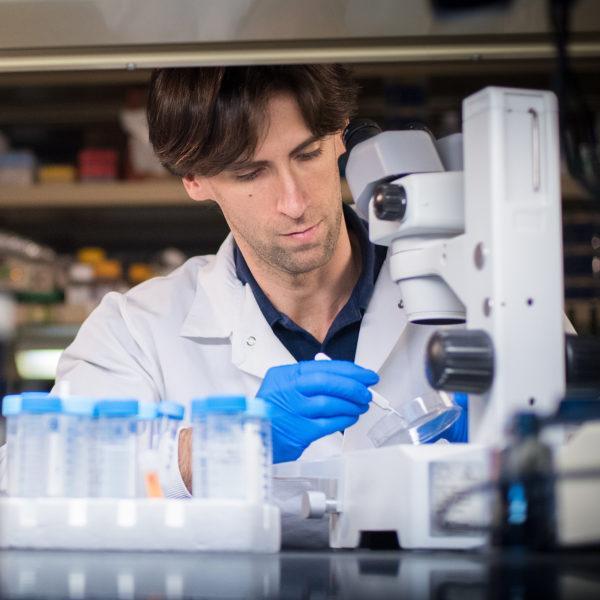Research Focus
Our goal is to identify mechanisms that support haematopoietic stem cell function and understand how the leukaemic stem cells “play” with these mechanisms to thrive.
Key Publications
The global clonal complexity of the murine blood system declines throughout life and after serial transplantation. Blood (2019) 133(18):1927-1942. PMID: 30782612
Murine hematopoietic stem cell activity is derived from pre-circulation embryos but not yolk sacs. Nature Communications (2018) 9(1):5405. PMID: 30573729
Life-long hematopoiesis is established by hundreds of precursors throughout mammalian ontogeny. Nature Cell Biology (2017) 19(10):1153-1163. PMID: 28920953
Genetic Inactivation of Cdk7 Leads to Cell Cycle Arrest and Induces Premature Aging Due to Adult Stem Cell Exhaustion. EMBO J (2012) 31(11):2498-510. PMID: 22505032
Major Funding
- 2022-2024 -The Kay Kendall Leukaemia Fund, £137,792
- 2021 American Society of Hematology (ASH) Global Research Award, $150,000
- 2021-2025 - Medical Research Council, Career Development Award, 'Genetic identification and functional dissection of the bone marrow niches that support haematopoietic stem cells and leukaemic stem cells,' £1,528,102
- 2020-2022 - Leukaemia UK, John Goldman Fellowship, 'Deconvoluting novel pathways leading to clonal haematopoiesis,' £123,856
- 2020-2022 - Barts Charity
Other Activities
- Member of the American Society of Hematology (ASH)
- Member of the European Hematology Association (EHA)
- Member of the International Society of Experimental Hematology (ISEH)
- Member of the Spanish Society for Biochemistry and Molecular Biology (SEBBM)
Research
Haematopoietic stem cells (HSCs) sit at the top of the haematopoietic hierarchy and replenish all blood cell lineages to support lifelong haematopoiesis. Adult HSCs reside in specialised bone marrow (BM) niches, which support their functions. During leukaemogenesis, HSCs and progenitor cells can acquire mutations that lead to the emergence of leukaemic stem cells (LSCs). LSCs are able to alter the BM niches to thrive. Importantly, quiescent LSCs are resistant to cytotoxic therapies and responsible for leukaemia relapses.
A clear understanding of the cellular and molecular composition of the BM niches that support and regulate HSC function, and how LSC exploit these niches is fundamental to:
- Develop novel niche-based therapies to maintain HSC fitness during ageing (to prevent the emergence of clonal haematopoiesis, BM failure and other conditions)
- Successfully target LSCs in leukaemia treatments.
- Develop protocols for the efficient in vitro expansion of HSCs for widespread transplantation purposes to improve BM transplantation outcomes, reduce the need of BM donors, model blood conditions and simplify genetic therapy approaches.
Among the effects of ageing in HSCs, we are interested in unveiling and modelling the mechanisms that drive clonal haematopoiesis (CH, i.e. the expansion of clones harbouring certain mutations that confer them with a particular increase in fitness) and to explore niche-based therapies to prevent it. CH has been recently linked to an increase in the development of leukaemia and cardiovascular conditions.
Our lab combines cutting-edge technologies including state-of-the-art genetic mouse models, multiplex-flow cytometry and single-cell RNA-sequencing to identify and characterise specific bone marrow populations critical to support HSC and LSC functions and to expose mechanisms in CH.
Other Activities
- Member of the American Society of Hematology (ASH)
- Member of the European Hematology Association (EHA)
- Member of the International Society of Experimental Hematology (ISEH)
- Member of the Spanish Society for Biochemistry and Molecular Biology (SEBBM)
Major Funding
- 2022-2024 -The Kay Kendall Leukaemia Fund, £137,792
- 2021 American Society of Hematology (ASH) Global Research Award, $150,000
- 2021-2025 - Medical Research Council, Career Development Award, 'Genetic identification and functional dissection of the bone marrow niches that support haematopoietic stem cells and leukaemic stem cells,' £1,528,102
- 2020-2022 - Leukaemia UK, John Goldman Fellowship, 'Deconvoluting novel pathways leading to clonal haematopoiesis,' £123,856
- 2020-2022 - Barts Charity
Recent Publications
Clones assemble! The clonal complexity of blood during ontogeny and disease. Ganuza M, Hall T, Obeng EA et al. Experimental Hematology (2020) 83(1) 35-47
https://www.ncbi.nlm.nih.gov/pubmed/32006606
The global clonal complexity of the murine blood system declines throughout life and after serial transplantation. Ganuza M, Hall T, Finkelstein D et al. Blood (2019) 133(2) 1927-1942
https://www.ncbi.nlm.nih.gov/pubmed/30782612
Murine hematopoietic stem cell activity is derived from pre-circulation embryos but not yolk sacs. Ganuza M, Chabot A, Tang X et al. Nature Communications (2018) 9(1) 5405-5405
https://www.ncbi.nlm.nih.gov/pubmed/30573729
Nfix Promotes Survival of Immature Hematopoietic Cells via Regulation of c-Mpl. Hall T, Walker M, Ganuza M et al. Stem Cells (2018) 36(2) 943-950
https://www.ncbi.nlm.nih.gov/pubmed/29430853
Lifelong haematopoiesis is established by hundreds of precursors throughout mammalian ontogeny. Ganuza M, Hall T, Finkelstein D et al. Nat Cell Biol (2017) 19(2) 1153-1163
https://www.ncbi.nlm.nih.gov/pubmed/28920953
Hematopoietic stem cells under pressure. Ganuza M, McKinney-Freeman S Curr Opin Hematol (2017) 24(1) 314-321
https://www.ncbi.nlm.nih.gov/pubmed/28375987
Murine hemogenic endothelial precursors display heterogeneous hematopoietic potential ex vivo. Ganuza M, Hadland B, Chabot A et al. Exp Hematol (2017) 51(2) 25-35.e6
https://www.ncbi.nlm.nih.gov/pubmed/28450163
Functional screen identifies regulators of murine hematopoietic stem cell repopulation. Holmfeldt P, Ganuza M, Marathe H et al. J Exp Med (2016) 213(2) 433-449
https://www.ncbi.nlm.nih.gov/pubmed/26880577
Functional Screen Identifies Novel Regulators of Murine Hematopoietic Stem Cell Engraftment Fernandez MG, Holmfeldt P, Marathe H et al. Blood (2014) 124(10) 4321
Cdk7: open questions beyond the prevailing model. Ganuza M, Santamaría D Cell Cycle (2012) 11(2) 3519-3520
https://www.ncbi.nlm.nih.gov/pubmed/22935708
Team
Postdoctoral Researchers- Dr Raúl Sánchez-Lanzas
- Dr Amanda Jiménez-Pompa
- Foteini Kalampalika
- Justin Barclay
Biography
Miguel Ganuza was awarded his PhD from the Universidad Autónoma de Madrid (Spain) in 2009. His dissertation focused on understanding the roles of Cdk7 in cell cycle and transcriptional regulation. He worked as a PhD student in the laboratory of Prof Mariano Barbacid under the guidance of Dr David Santamaría (2004-2011, Spanish National Cancer Center, CNIO, Spain). In 2012 he joined the laboratory of Prof Shannon McKinney-Freeman (2012-2020, St. Jude Children’s Research Hospital, Memphis, USA) to study the molecular processes that govern embryonic haematopoiesis and adult bone marrow transplantation. He joined Barts Cancer Institute in 2020.

